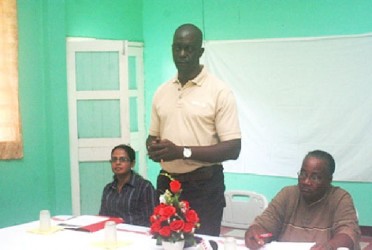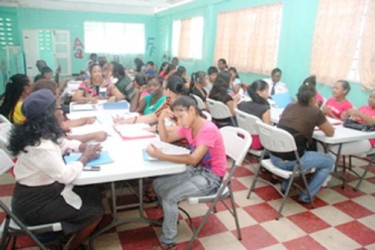The Ministry of Human Services and Social Security held a one-day training session in Bartica, Region Seven on Saturday to sensitise residents about Trafficking in Persons (TIP), according to a release from the Government Information Agency yesterday.
Bartica is the gateway to the mining interior where the majority of TIP crimes are believed to occur. The session comes in the wake of continuing concerns that the government is not doing enough on TIP. An annual US report on the problem has cited Guyana again for not doing enough. Simultaneously with the release of the report, the US honoured Guyanese, Simona Broomes as a TIP hero for her work in the women miners association. Broomes has been involved in several dramatic rescues of TIP victims and has criticized government agencies for not being responsive on the matter.

Saturday’s session was held in collaboration with the United Nations Development Programme (UNDP) and was conducted at the Bartica Nursery school. GINA said it was facilitated by UNDP official Trevor Benn, Co-ordinator, Help and Shelter, Margaret Kertzious and the ministry’s Counter-Traffick-ing in Persons Unit Co-ordinator, Tricia Watson and Technical Officer, Kester Harding. Region Seven Chairman Gordon Bradford was also present.
GINA said the group addressed the participants on distinguishing labour exploi-tation, human smuggling and human trafficking, child work, child labour and child trafficking and Guyana’s response to these. The victim support services offered by the Ministry of Labour, Human Services and Social Security and the role of Help and Shelter in combating TIP were also discussed.
GINA said that during this month, the ministry launched a country-wide public awareness campaign conducting training sessions in Regions Four, Six, Eight and Nine. Region Seven is the latest region on the programme.
“Hopefully in the not too distant future, we will have many more people who, based on the new information, will be able to support the government and their communities in combating incidents of TIP,” Benn said, according to GINA.
“We know and recognise that this is a very sensitive and serious issue in the country and the UNDP hope that at some point based on our support, we will be able to assist the Government in bringing some level of normalcy to the country when it comes to issues relating to TIP, in the sense that we will find ways to reduce as much as possible those incidences and eradicate if possible and that we will be able to have a population that support those efforts,” Benn added.

Bradford said, according to GINA, that he was pleased with the turnout, especially the large percentage of youth as they were the ones more vulnerable to the scourge. He said it was vital that the youths from the Amerindian communities in the region be educated on the issue, since these communities usually lack access to such information.
The ministry plans to host the next training exercise in Region One, following which the plan is to bring persons from all the regions where the sensitisation exercises were conducted, GINA added.





